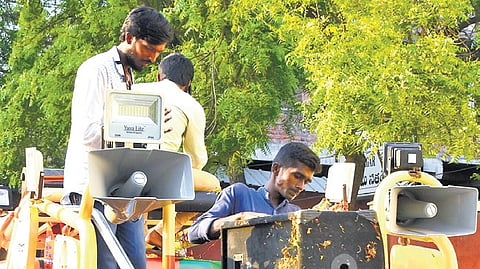

The deafening noise of DJs and public address systems have emerged as a bane of modern life. Many of us—old or young, healthy or delicate, sleepaholic or insomniac—often suffer from uncontrolled cacophony in our neighbourhood or public area. Come elections, and noise levels in both urban and rural areas destabilise lives and inflict misery on helpless citizens. However, the enforcement authorities tasked with protecting us from such debilitating intrusion often turn a deaf ear.
The Centre in 2000 framed the Noise Pollution (Regulation and Control) Rules that prescribe permissible noise levels or ambient air quality for different areas, separately for day and night time. While the maximum permissible noise level for residential areas respectively for day and night time has been fixed at 55 and 45 dB(A), those for Silence Zones are 50 and 40 dB(A). Rules also state a loudspeaker shall not be used between 10 pm and 6 am, except in closed premises like auditoriums, conference rooms, community and banquet halls; that too, for communication within. Further, a loudspeaker shall not be used except after obtaining written permission of the competent authority. The Rules, however, are confined to books only and flagrant violations are the norm.
In July 2005, the then Chief Justice R C Lahoti held that noise adversely affects the right to life, which is a fundamental right enshrined in Article 21 of the Constitution; he ordered that, first, noise level shall not exceed 10dB above the standard ambient noise for the area or 75dB, whichever is lower; second, no one shall use amplifiers between 10 pm and 6 am except in public emergencies; and third, states shall make provision for confiscation of loudspeakers and amplifiers found to create noise beyond the permissible limit. Earlier, in Church of God in India vs KKR Majestic Colony Welfare Association (August 2000), the Supreme Court had held even religious activities cannot be blasted on amplifiers.
The rules provide that it is the responsibility of authorities, defined as District Magistrate or Police Commissioner or any other officer not below the rank of a DSP, to enforce noise pollution control measures. Anyone can make a complaint and the authority can prohibit emission of such excess noise, besides initiating necessary legal action against the violators. Contravention can make one liable for imprisonment up to 5 years and/or a fine up Rs 1 lakh, provided the complaint is filed by ‘authorised’ officials, which includes central and state pollution control board officials and collectors and sub-divisional magistrates.
While action by such authorised officials have been few and far between, the police, in absence of power to prosecute under the Rules except in states like Karnataka, often treats noise pollution as a “public nuisance” under Section 268 of the IPC, thereby making it punishable under Section 290, which provides for a meagre fine of up to Rs 200. The police also move the executive magistrate to pass an order under Section 133 of the CrPC for the removal of such nuisance. In case of failure to do so, the violator becomes liable for punishment under sections 188 and 291 of the IPC, which provide for a maximum imprisonment of only 6 months.
National Crime Records Bureau data shows that 7,378 police cases were registered in India during 2022 relating to noise pollution. Almost 99 percent of the cases were registered in Rajasthan alone, while UP registered just one case. As many as 20 states registered no case at all. Rajasthan is the only state that makes contravention a cognisable offence under section 7 of Rajasthan Noise Control Act,1963, which explains why well-nigh all noise pollution cases are registered there. 99% of cases have ended in conviction, largely because of admissions of the accused since the prescribed punishment is a meagre fine of maximum Rs 250 for the first conviction. Resultantly, the impact of police action is limited and the fear of law minimal.
Only a handful of states like Odisha, Bihar, Assam and Madhya Pradesh have enacted specific legislations to control the use of loudspeakers and provide punishment for contravention. However, offences for violations of noise control limits in these states are non-cognisable in nature and even the punishments are lenient, due to which police action has limited impact. State pollution control boards and magisterial authorities, conferred with power to penalise noise pollution under the Environment Protection Act,1986, are hardly seen acting.
Thus, violations are widespread and flagrant. In the name of religion, temples and mosques openly violate noise limits. Election campaigning turns out to be a nightmare. Community fairs and festivities are also a time for aperta contra legem, or flouting the law. The result is the unmitigated suffering of helpless citizens who seemingly have no recourse to relief.
In addition to causing harmful health effects, including hearing damage, palpitation and tinnitus, louder-than-allowed sound symbolises a lack of civility, breakdown of social etiquettes and collapse of human concern. It represents a challenge to law enforcement and an imposition of hooliganism of a few upon the vast majority of silent sufferers. It is time we put a stop to this by ensuring we have befitting laws at the central or state levels, making such offences cognisable and providing for stricter punishment, including pre-conviction confiscation of the contravening equipment. Authorities mandated should also be made to act with sensitivity to protect helpless citizens.
(Views are personal)
B K Sharma | Former Director General of Police, Odisha